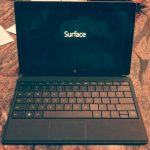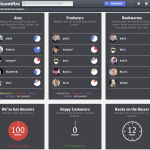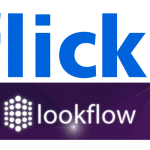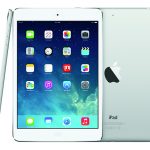All-in with Microsoft, part 2 -- Surface 2 is my new favorite device

This past Tuesday, I announced my Microsoft-only experiment. My goal is to only use Microsoft devices for a week -- not easy for a Linux user -- and I have since followed through on that commitment. Armed with only a Surface 2 (Windows RT 8.1), Nokia Lumia 928 and a Windows 8.1 desktop, I managed to make the transition, although it was not all sunshine. More on that later.
As someone who writes a lot, a good keyboard is a must. Believe it or not, the Surface's on screen keyboard is simply brilliant. I can type better on it than the iPad or any Android keyboard. It is very responsive and the auto-correct feature works well. I even find the audio feedback to be oddly pleasing. On Android, I turn off the volume, as I find the clicking sound to be annoying, not here; it actually adds to the experience.
Bloomfire streamlines corporate knowledge sharing

We've seen a raft of tools in recent months that seek to combine business intelligence with elements of social networking. Bloomfire's USP in this field is that it seeks to capture the knowledge that already exists within an enterprise and use it to deliver improved employee engagement and ultimately better customer service.
Bloomfire has a clean interface reminiscent of Google+ and it works by dividing content into "feeds". These are designed to deliver content that’s relevant to the individual whilst filtering out noise so that people can find the information they need to do their jobs. Notifications can also be customized so that relevant notifications and tags aren't missed. The result is more time spent on the actual task and less managing the system. In any case it's designed to be used by business people rather than technicians.
Most people still not doing enough to safeguard their personal data

I know a couple of people who have been victims of identity theft, and while they didn’t lose anything financially, there was a lot of work required afterwards to clear up the mess and put safeguards in place to ensure it didn’t happen again. What was amazing to me was that the thieves were able to do things like open store cards with information that was not only false, but incorrect (an entirely fictitious date of birth, for example).
A new infographic from Experian looks at the dangers of identity theft both on and offline, and provides statistics that show while most of us are aware of the risks, few of us actually do enough to properly safeguard our personal information. The findings probably won’t surprise you.
CCleaner adds Windows 8.1 support, ability to remove previous Windows installations

Piriform has released its regular monthly update to CCleaner with the release of CCleaner 4.07. Also available in portable form, version 4.07 adds official support for the recently released Windows 8.1 update, plus supports the Release Preview of IE11 for Windows 7.
The new build also adds a new option that enables users to free up drive space by clearing out old folders left behind by previous versions of Windows.
Microsoft says Surface 2 is better than iPad Air with iWork, but fails to convince

I am the sort of person who values a versatile device, that lends itself well both to productivity work and content consumption, in a portable package. In my opinion, Microsoft's Surface Pro 2 strikes the right balance and is definitely the tablet that I would buy if I were in the market for such a device. On the productivity side, it is an uncompromised machine that can run every piece of software that I want or need. Unquestionably, it puts Apple's new iPad Air to shame in this regard.
But the same cannot be said about the Surface 2, that ships with Windows RT 8.1. The tablet is not as good as the Surface Pro 2 when it comes to productivity work as it cannot run the same software nor is it as good as the iPad Air when it comes to content consumption, due to a still inferior app selection. But what happens when the Surface 2 is compared to the iPad Air, from a productivity standpoint?
Three in four UK homes now has access to superfast broadband

UK telecoms regulator Ofcom's annual Infrastructure Report update published today shows that 73 percent of premises are now able to receive superfast broadband, up from 65 percent last year.
Ofcom defines "superfast" as networks delivering download speeds of at least 30 Mbit/s, typically delivered using fiber optic cabling. Around 22 percent of connections now fall into this category with some 4.8 million consumers now having superfast connections, more than doubling last year's 2.1 million figure.
Protect your passwords from keyloggers with Oxynger KeyShield

Following good password policy is a key part of staying safe online. You should be using lengthy passwords, for example, with mixed case, numbers and special characters, as well as ensuring you use a different password on every site.
All of this will be entirely useless, of course, if your system has a keylogger which is recording everything you type. Your antivirus package should detect and block any attempt to install one, but if you’d like an extra layer of protection then Oxynger KeyShield could be very interesting.
Google breaks its promise and experiments with banner ads

Google's ad-supported model is one that we're now all familiar with. Spend any amount of time online and, unless you have installed some form of ad-blocker, you'll see text advertisements littering numerous websites you visit, including in your search results.
Sponsored search results are nothing new, but Google is now experimenting with large banner ads which show up when certain searches are performed.
Microsoft Surface Pro gets a new price cut

In early August, Surface Pro received a $100 price cut in an attempt to lure prospective buyers, following the less than stellar revenues generated by Microsoft's tablet lineup. The base model would run for a more accessible $799, with the flagship costing $899. Now, the software giant is at it again, slashing the price of its Surface Pro one more time.
The latest Surface Pro price-cut comes in response to the arrival of the new Surface Pro 2, that touts significantly better battery life and performance improvements and a price that kicks off at $899 for the base model. Unsurprisingly, Microsoft wants to give Surface Pro a real fighting chance at raking in more sales before pulling the plug.
Yahoo acquires image recognition startup LookFlow -- Flickr to benefit

One of Yahoo's most popular and successful products is Flickr. Adding to its list of acquisitions, the company is now taking LookFlow under its wing.
This California-based startup, which specializes in image recognition technology, is joining forces with Yahoo to "build a new deep learning group". It is likely that we'll see image based searching added to Flickr in the near future.
iPad mini pricing invalidates 'price umbrella' theory

Apple's long-awaited iPad refresh is finally a reality. Apple's new full-size iPad, rebranded as the "iPad Air", starts at the usual $499 price. Apple also unveiled an iPad mini with retina display, with a higher starting price of $399 and retained the original iPad mini at $299. Finally, the aging iPad 2 was also retained with the price unchanged at $399. This essentially proves my theory that Apple's pricing strategy has nothing to do with a "price umbrella" and everything to do with margins.
Apple's primary business model is selling high-margin hardware, so this should come as no surprise. While many like to draw comparisons to the iPod, the limited set of "jobs to be done" allowed Apple to aggressively slash BOM costs, thereby allowing lower prices at higher margins. This approach is no longer viable for the iPhone/iPad because of broader use cases and competition from modular vendors. Based on this, let's take a look at the iPad product portfolio and gauge its impact on Apple's holiday quarter.
Microsoft targets musicians with the innovative Surface Music Kit

Microsoft is hoping to appeal to serious musicians and remixers with a new add-on for its tablet range. The Surface Music Kit is a backlit cover (called a Blade) that plugs into the Surface keyboard port and replicates the sort of hardware buttons typically used by a music producer or performer.
When you connect the Music Cover, it will install the companion app automatically, providing you with access to all of the building blocks of a song -- templates, drums, bass, keyboard, vocals, and so on. You can use it to create new music but it’s particularly well suited to remixes and mashups.
Microsoft's Office oxygen supply problem

Google, OpenOffice, LibreOffice and my company Zoho have all offered free office suites for years, and on Tuesday, Apple announced that its productivity suite iWork will now also be available for free on all new Apple Macs and iPads.
Given that Microsoft Office has long been the de-facto monopoly, none of these rival companies have anything to lose in commoditizing the office suite market. That is the nice thing about facing a monopoly in an adjacent market -- every player other than the monopoly would win if they get a non-zero share of a massively shrunk market. If the $20 billion market shrinks to $2 billion, we at Zoho would celebrate it, as long as we can hope to get a share of that shrunken market. In fact, competitors would win even if they don't get any share of the shrunken market, because it denies the monopoly the ability to use its cash cow to dominate adjacent markets they do have an interest in.
Apple's mini tab weighs down iPad Air

New iPads reveal much about Apple's current and long-term device dilemmas. Full-size iPad cannibalizes Mac sales, while mini does the same to the larger tablet. Those are the clear takeaways from yesterday's product launches.
CEO Tim Cook is no Steve Jobs, and perhaps that's a good thing. Where Jobs championed grammatically incorrect "think different" -- as a marketing and product development strategy -- Cook thinks differently, making fundamentally difficult branding and pricing decisions to preserve current and future Apple crops. There's great risk in the strategy and greater by doing nothing.
Pixelmator 3.0 FX adds layer styles and liquefy tools, OS X Mavericks support
Lithuanian developer The Pixelmator Team has released Pixelmator 3.0 FX, a major update to its popular Mac image-editing tool. Version 3.0 adds non-destructive Layer Styles, allowing users to apply multiple effects at once, as well as Liquefy Tools that allow users to shape images in multiple ways.
Version 3.0 also adds full support for OS X Mavericks, promising to tap into OS X 10.9’s new features like App Nap and Compressed Memory for faster, more efficient performance.
Recent Headlines
BetaNews, your source for breaking tech news, reviews, and in-depth reporting since 1998.
© 1998-2025 BetaNews, Inc. All Rights Reserved. About Us - Privacy Policy - Cookie Policy - Sitemap.